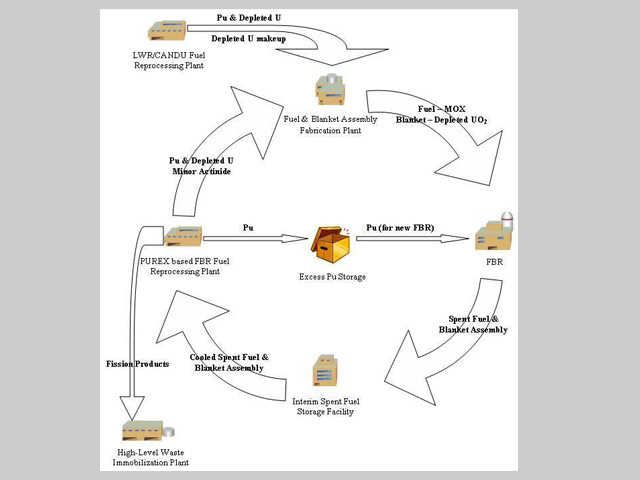Abstract:
Fast breeder reactors with a closed fuel cycle (FBRFC) are important to the sustainability, reliability, and security of the world’s long-term energy supply. The attractiveness of FBRFC include the conversion of abundant fertile isotope 238U into fissile material 239Pu at rates faster than it is consumed (breeding); a hundred-fold energy extraction potential from the same amount of mined uranium compared to its use in thermal reactors and the possibility of incinerating all long-lived heavy elements during reactor cycle. Knowing the vast potential of the FBRFC technology, countries like Japan, India, and China are actively pursuing research in this area for developing advanced commercial fast reactor energy systems. The United States, France and Japan have recently announced to increase the cooperation on sodium-cooled fast reactor prototypes. Also, the GEN IV international forum (GIF) proposal has three nuclear energy systems vis-a-vis; gas cooled fast reactor system (GFR), lead cooled fast reactor system (LFR) and the sodium cooled fast reactor system (SFR), all based on FBRFC technology. However, the breeding of nuclear weapons usable material 239Pu and its envisaged use in large quantities in FBRFC by design is a major concern for nuclear non-proliferation because of the vulnerability of special nuclear material (SNM) diversion from its peaceful uses to the destructive ones. Hence, to sustain the growth of nuclear energy in the current period of its renaissance, it is prudent to assess the proliferation resistance (PR) of the FBRFC when addressing other issues like, radioactive waste generation, economics and safety.
The nuclear security science and policy institute (NSSPI) at Texas A & M University has now taken up a research project to conduct pre-conceptual design studies for the integration of modern safeguards directly into the planning and building of FBRFC. The project is taken up under the sponsorship of DOE National Nuclear Security Administration’s office of Non-proliferation and International Security. The project tasks are to (a) identify a suitable PR assessment methodology from the available methodologies through literature survey, (b) develop nuclear material flow diagram of a generic FBRFC by computational efforts and (c) perform the PR assessment for different scenarios. The results of the project study should lead to high-priority tradeoff studies to figure out the possible weak links in the FBRFC aiding nuclear material proliferation and identifying ways to strengthen them by the integration of modern safeguards. Finally, it should aid the IAEA (or other inspecting entity) to effectively and efficiently monitor and verify SNM in a manner that provides minimal intrusion into normal plant or facility operations.

Schematic of the Fast Breeder Reactor Fuel Cycle
Associated Publications:
- S. Chirayath, W. Charlton, A. Stafford, C. Myers, B. Goddard, J. Alfred, M. Carroll, M. Sternat, and E. Rauch, "Risk Informed Safeguards Integration Studies for a Fast Reactor Fuel Cycle", 51st Annual Meeting of the Institute of Nuclear Materials and Management, Baltimore, MD, USA, July 11-15, 2010.
- S. Chirayath, W. Charlton, A. Stafford, C. Myers, B. Goddard, J. Alfred, M. Carroll, M. Sternat, E. Rauch, "Risk Informed Safeguards Approaches for Fast Reactor Fuel Cycle Utilizing MAUA based Proliferation Resistance Assessment", NSSPI-10-002, January 15, 2010.
- S.S. Chirayath, G. Hollenbeck, J. Ragusa, P. Nelson, "Neutronic and nonproliferation characteristics of (PuO2-UO2) and (PuO2-ThO2) as fast reactor fuels", Nuclear Engineering and Design, 239, 10 (2009).
- E.B. Rauch, W.S. Charlton, D.G. Ford, "Developing a Safeguards Approach for a Small Graphite Moderated Reactor and Associated Fuel Cycle Facilities", 2009 Annual Meeting of the Institute of Nuclear Materials Management, Tucson, AZ, July 12-15, 2009.
- S.S. Chirayath, J. Ragusa, and P. Nelson, "Thorium blended and regular MOX burn-up studies for fast reactor fuel cycle safeguards", 50th annual meeting of INMM, July 12-16, 2009, Tucson, AZ, USA.
- E. Rauch, "Development of a Safeguards Approach for a Small Graphite Moderated Reactor and Associated Fuel Cycle Facilities", M.S. Thesis, Texas A & M University, May 2009.
- S. Chirayath, R. Metcalf, J. Ragusa, P. Nelson, "Assessment of Proliferation Resistance Requirements for Fast-Reactor Fuel-Cycle Facilities", 8th International Conference on Facility Operations - Safeguards Interface, Portland, Oregon, March 30 - April 4, 2008.